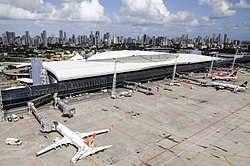Learning patterns/Air travel
What problem does this solve?[edit]
How do we arrange safe and cost-effective air travel?
What is the solution?[edit]
There are many considerations and problems that may arise when planning air travel.
- For general information about travel planning please see Grants:Learning patterns/Arranging travel.
Things to consider[edit]
Note that some of these best practices are applicable in multiple countries.

Wikivoyage has extensive tips about air travel.
Australia—Generally, advance purchases (2 weeks or more) can result in cheaper tickets. The use of demand-driven pricing means that the price of tickets can rise or fall as the date of the flight gets closer. Some last-minute tickets on under-booked flights can actually be cheaper but cannot be relied upon. Cheap tickets often have restrictions in relation to refunds and rescheduling and luggage, but frequently these are not a problem in practice. However, if the travel policy mandates the use of cheapest tickets, will the organization cover the extra cost imposed when those restrictions become a problem, e.g. a flight is missed due to city traffic jams? Generally flights between the state capitals are cheaper than to regional areas, due to demand and competition. However, Australian distances generally mandate air travel.
United States—For domestic flights in the United States, plan flights at least three weeks out. Flights between countries require more advance planning. Once you are closer to the date of the meeting, costs can increase extraordinarily. The temptation is to book the cheapest flight there is, but do so with caution. Certain itineraries introduce hidden costs. For instance, flights arriving late at night may require your attendee (or your organization) to pay for a potentially costly cab ride from the airport, as much cheaper mass transit won't be an option. If your itinerary involves stopping at one or more airports before reaching the final destination, plan for at least one and a half hours between flights to account for potential flight delays. Paying attention to the timing of the flights can save you time, money, and trouble—this is especially important if you are planning travel for a lot of people.
Europe - Easyjet is not always the cheapest, particularly when booking shortly (2-3 weeks) before flying: the low-cost segment is now very competitive. Use aggregators, bearing in mind some may have hidden processing fees only shown at time of booking. Useful/well designed sites include eDreams, Hipmunk, kiwi.com and Skyscanner. Also do not forget to include the price of checked-in luggage if applicable, and transportation costs (time- and money-wise) to/from the airport into your calculation (this is particularly true for cities with several airports like London and Paris). Last but not least, do your searches in Private mode as some aggregators use cookies to know you already looked into a specific trip and jack up the price accordingly. It always pays off to find a good routing using an aggregator, and then checking the price with the actual airline.[1] Sometimes it is cheaper than the aggregator, sometimes more expensive.
Africa - Low cost companies travel in particular between Europe and North Africa and there are other low cost companies in South Africa (for internal flights). If there are large communities originally from Africa in another countries, there might be between the two companies which offer cheap airline rates, but consider that during holidays flights might be fully booked.
Endorsements[edit]
- Really good tips for air newbies, especially the note about private mode and aggregators - very true. Jakub.klimek (talk) 11:44, 1 August 2019 (UTC)
See also[edit]
Related patterns[edit]
- Grants:Learning patterns/Arranging travel
- Grants:Learning patterns/International travel
- Grants:Learning patterns/Rail travel
- Grants:Learning patterns/Automobile travel
- Grants:Learning patterns/Short-distance travel
External links[edit]
References[edit]
- Learning patterns
- Draft learning patterns
- Event management learning patterns
- Project management learning patterns
- Programs learning patterns
- Learning patterns not yet ready for translation
- Conferences learning patterns
- Hackathon learning patterns
- Participation learning patterns
- High complexity learning patterns

